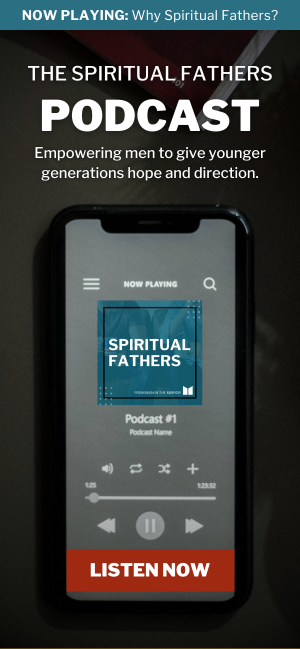It’s Your Move
By the Man in the Mirror Team
This is the second article in our current series on reaching younger men.
The book of Titus provides us with one component of discipleship—the model of more experienced believers coming alongside younger believers and showing them the ropes.
Yet, today few young men have older men pouring into them on any level, let alone spiritually. This form of discipleship is missing from the lives of most believers.
Perhaps part of the hindrance is how we define discipleship. As leaders, we have to first recognize that meaningful discipleship is rooted in relationship more than a program or curriculum.
Being Known
In recent years, it seems the culture rushes to smack a label on every trend, phenomenon, and group that emerges. Although these labels can be helpful in providing a framework and common language for talking about them, the labels can also be limiting (at best) or harmful (at worst).
By nature, labels deal in generalizations, leaving little room for nuance. This is certainly true when we discuss different generations. People within the same generation do share unique cultural differences, whether it’s having experienced Vietnam, the tech boom of the 90s, or having never interacted in a world without social media.
However, every generation is made up of individuals with different backgrounds, experiences, preferences, and personalities that transcend the year they were born.
When we talk about “Millennials,” “Boomers,” “Zoomers,” etc. within the context of the sweeping generalizations that often accompany these labels, we can create barriers to connection, even within the church.Click To TweetWhat are some of the stereotypes that come to mind right away? We’ve all heard them: Boomers are judgmental and out of touch; Millennials are lazy and want participation trophies in life; Zoomers are addicted to their smart phones and digital approval; the list goes on.
We can’t talk productively about how to reach younger men until every one of us answers these two questions honestly:
- Will I peel back the constructed labels far enough to let God show me the similarities in how He created us?
- Will I peel back the stereotypes and generalizations that can be intimidating and get to know a younger man? Really get to know him?
There is a deep need among young men to be truly known. With a few clicks, they have access to the best preaching, communicators, Bible commentaries, and thinkers in the world. What they need is someone further along than them to come alongside them—to really know them and provide space for them, to talk with them and not at them.
Broken Trust
Too often, men have had a troubled relationship with their father—whether absent, addicted, dead, harsh, inattentive, or silent. The impact of fatherlessness—both literal and perceived—can be another barrier to younger men looking to older men for guidance. (But it also creates a hunger for it!)
And it’s not just the absence of parental authority; broken trust in spiritual authority also plays a central role in the discipleship breakdown. As we talk to younger men who are disengaging from the church or struggling in their faith, one thing we often find when we dig deeper is that a spiritual leader they respected failed in a significant way—adultery, abuse of power, financial impropriety, or even renouncing Christ altogether.
We must acknowledge this hurt exists and that it’s real as the first step to connecting with these young men whose trust has been broken.
For you to gain some level of trust as a father-like figure or spiritual mentor, the young men we spoke to agreed on a few needs: 1) You don’t have to be perfect but you do need to be authentic. Sharing one’s experiences—including failures and lessons learned—builds trust; 2) You do need to consistently show up; and 3) You need to genuinely care.
What might this look like? 1 Thessalonians 2:8b describes, “Because we loved you so much, we were delighted to share with you not only the gospel of God but our lives as well.”
Are you willing to—out of love—share your life and your lessons learned from walking with Christ?Click To TweetExperiential Wisdom
Although young men are often engaged with other believers their own age, the lack of age diversity means there’s also a lack of experiential wisdom from more experienced believers—from “seasoned vets,” as Jeremy put it, a young husband and father of three.
“I’m trying to figure out this career stuff, marriage, and parenting,” he said. “It’s overwhelming. I need help!” This is where many men find themselves.
Is there a particular area of life where you’re a “seasoned vet”? Have you had a successful, decades-long marriage? Have you built a business and honored God through your work? Have you recovered from a gambling, pornography, or alcohol addiction? Have your raised your children well? Have you managed your money wisely, no matter the dollar amount? Have you incorporated spiritual disciplines into your daily life that have transformed you? Have you navigated life with a physical or mental disability?
While you don’t need to be perfect, it is helpful if you’ve learned to succeed in an area that a younger man is currently trying to figure out. If you have similar goals, experiences, or circumstances (i.e. both single dads, both recovered addicts, both entrepreneurs, both married), your time together will be that much more valuable.
In what area are you a seasoned vet?
Your Next Move
We asked Nick, a believer in his mid-30s, “Why do you think you’ve never had a mentor or older man discipling you?”
He thought about it for a moment before answering. “No one has ever asked me.” He conceded that although that was something he’d be interested in, it was unlikely he’d ever approach an older man with the request. “What would I even say?” he added. “I’m not going to just walk up to a guy and say, ‘Hey, do you want to grab coffee sometime and mentor me?’ It’s not going to happen.”
The reality is that few young men feel comfortable taking the initiative to ask an older man to meet with him on a regular basis. Whether it stems from broken trust, a lack of familiarity, or simply feeling awkward, the chances of a man who is younger than you approaching you with this invitation are slim to none.
So how do you emulate the model given in Titus, in spite of this? What’s your next move?
It’s simple: the onus is on you. Take a look at this verse:
“Even when I am old and gray, do not forsake me, my God, till I declare your power to the next generation, your mighty acts to all who are to come.” Psalm 71:18, emphasis added
Notice the verse isn’t “till the next generation shows up at my door and begs me to disciple them.” Or even “till the next generation comes to my men’s event or Saturday morning Bible study.”
Whether you’re 30, 50, or 70, there is a younger man in your orbit who is trying to figure out what it means to walk with Christ in some area of his life. He might be at your church, across the street, the son of a friend, or two offices down at work. It’s up to you to go out of your way to cultivate the relationship.
Be ready. Be available. Be intentional. Be purposeful. Be sincere.
A note to those who are reading this and thinking, I’m not spiritually mature enough right now to disciple someone else. Or maybe you read the description of older men in Titus 2 (“temperate, worthy of respect, self-controlled, and sound in faith, in love and in endurance”) and know you can’t describe yourself in these terms—yet.
If this is you, then your next step is different; we encourage you to ask a more spiritually-mature man to come alongside you and meet regularly with you. We are confident that God, who began a good work in you, will carry it on to completion until the day of Christ Jesus (Philippians 1:6).
In His timing, God will then use you to disciple others. As one young man, Daniel, said after going through several weeks of one-on-one mentoring, “I think God is showing me the power of true discipleship and how much one caring life can impact many others. It has caused me to seriously consider becoming a mentor to someone else.”
THE BIG IDEA: Meaningful discipleship is rooted in relationship more than a program or curriculum, and it’s only through relationship that we will disciple younger men.
♦♦♦








